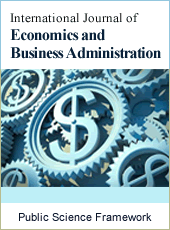International Journal of Economics and Business Administration
Articles Information
International Journal of Economics and Business Administration, Vol.6, No.2, Jun. 2020, Pub. Date: Jul. 15, 2020
Impact of Managers’ Soft Skills on Project Performance in Rwanda
Pages: 72-77 Views: 2023 Downloads: 519
[01]
Emmanuel Gatsinzi, Faculty of Business Administration, Mount Kenya University, Kigali Campus, Kigali, Rwanda.
[02]
David Nyambane, Faculty of Business Administration, Mount Kenya University, Kigali Campus, Kigali, Rwanda.
The technological advances have strongly impacted on the work environment. However, this technology still requires oriented and disciplined soft skills among managers and their employees for effective organizational performance. The main objective of this study was to analyse the impact of manager’s soft skills on project performance at Kivu Methane Gas Extraction Project in western Rwanda. The study adopted a descriptive and analytical research design with a sample size of 120 respondents. The authors utilized questionnaires and interviews to collect data which later were analyzed by using correlation techniques. The results indicated that manager’s team building skills had a positive impact on the quality of the project outcome due to the obtained correlations (r=0.279, p<0.01). In addition, 56% scored the project outcome as highly significant due to managers’ skills, and the analysis showed how the budget compliance and quality of project outcome had a positive relationship with customer service delivery r = 0.721, p<0.001; r = 0.000, p < 0.001; respectively at 0.05 level of significance. And, this positively impacts on the entire project performance. Finally, it is concluded that managers’ soft skills adds customer outcome quality profitability and influences the project performance as well.
Kivu Methane Gas Project, Project Performance, Public Sector, Soft Skills, Rwanda
[01]
Deepa S, Seth M. Do soft skills matter?-Implications for educators based on recruiters' perspective. IUP Journal of Soft Skills, 7 (1) 2013: 7.
[02]
Tahir M. he Effect of Project Manager’s Soft Skills on Success of Project in the Construction Industry. International Journal of Applied Research in Social Sciences 1 (5) 2019.
[03]
Tseng H, Yi X, Yeh H-T. Learning-related soft skills among online business students in higher education: Grade level and managerial role differences in self-regulation, motivation, and social skill. Computers in Human Behavior 2019; 95: 179-86.
[04]
James RF, James ML. Teaching career and technical skills in a" mini" business world. Vol. 59, pp. 39-412004.
[05]
Robles MM. Executive perceptions of the top 10 soft skills needed in today’s workplace. Business communication quarterly, 75 (4), 2012: 453-65.
[06]
Narayanaswamy R, Grover V, Henry R. The impact of influence tactics in information system development projects: A control-loss perspective. ournal of Management Information Systems, 30 (1) 2013: 191-226.
[07]
Pazhani SS, Priya TS. Need for soft skills development towards managerial efficiency. International Journal of Management Research and Reviews 2012; 2: 1895.
[08]
Doughty K. Converting threats to power: Methane extraction in Lake Kivu, Rwanda. Governance in the Extractive Industries: Routledge; 2017. p. 95-114.
[09]
Bimenyimana S, Asemota GN, Li L. The state of the power sector in rwanda: a progressive sector with ambitious targets. Frontiers in Energy Research 2018; 6: 68.
[10]
Safari B. A review of energy in Rwanda. Renewable and Sustainable Energy Reviews 2010; 14: 524-9.
[11]
Harrington HJ, McNellis T. Project management excellence: the art of excelling in project management (Vol. 2): Paton Professional; 2016.
[12]
OAG. Office of the Auditor General. Performance Audit Report on Water Production and Distribution in Kigali City by EWSA, Kigali-Rwanda. 2014.
[13]
Etikan I, Alkassim R, Abubakar S. Comparision of snowball sampling and sequential sampling technique. Biometrics and Biostatistics International Journal 2016; 3: 55.
[14]
Levy PS, Lemeshow S. Sampling of populations: methods and applications: John Wiley & Sons; 2013.
[15]
Happell B, Carta B, Pinikahana J. Nurses’ knowledge, attitudes and beliefs regarding substance use: A questionnaire survey. Nursing & health sciences 2002; 4: 193-200.

ISSN Print: 2381-7356
ISSN Online: 2381-7364
Current Issue:
Vol. 7, Issue 4, December Submit a Manuscript Join Editorial Board Join Reviewer Team
ISSN Online: 2381-7364
Current Issue:
Vol. 7, Issue 4, December Submit a Manuscript Join Editorial Board Join Reviewer Team
| About This Journal |
| All Issues |
| Open Access |
| Indexing |
| Payment Information |
| Author Guidelines |
| Review Process |
| Publication Ethics |
| Editorial Board |
| Peer Reviewers |


